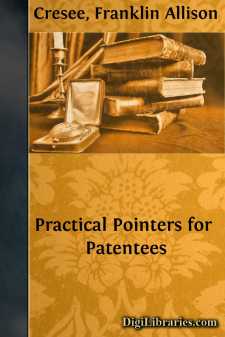Categories
- Antiques & Collectibles 13
- Architecture 36
- Art 48
- Bibles 22
- Biography & Autobiography 813
- Body, Mind & Spirit 142
- Business & Economics 28
- Children's Books 17
- Children's Fiction 14
- Computers 4
- Cooking 94
- Crafts & Hobbies 4
- Drama 346
- Education 46
- Family & Relationships 57
- Fiction 11829
- Games 19
- Gardening 17
- Health & Fitness 34
- History 1377
- House & Home 1
- Humor 147
- Juvenile Fiction 1873
- Juvenile Nonfiction 202
- Language Arts & Disciplines 88
- Law 16
- Literary Collections 686
- Literary Criticism 179
- Mathematics 13
- Medical 41
- Music 40
- Nature 179
- Non-Classifiable 1768
- Performing Arts 7
- Periodicals 1453
- Philosophy 64
- Photography 2
- Poetry 896
- Political Science 203
- Psychology 42
- Reference 154
- Religion 513
- Science 126
- Self-Help 84
- Social Science 81
- Sports & Recreation 34
- Study Aids 3
- Technology & Engineering 59
- Transportation 23
- Travel 463
- True Crime 29
Practical Pointers for Patentees
Categories:
Description:
Excerpt
CHAPTER I
DEMAND FOR INVENTIONS OF MERIT
That there is a demand for inventions of merit which can be readily disposed of at a reasonable profit to the inventor, there can be no doubt. There perhaps never was a time in the history of our country when the demand for meritorious inventions was so great as the present. The conveniences of mankind, in all his varied vocations and callings, require continual changes and improvements in the apparatuses and implements used in order to save time, labor, and expense, and to keep pace with the never-ceasing progress of civilization.
At no time in the past has there been so deep an interest manifested by the public generally in the inventions of our bright-minded men and women, and at no time has capital been more readily interested and ready to invest in any practical improvement which can offer a fair chance of monopoly under the patent laws.
Business men, capitalists, and manufacturers are ever on the alert for new and desirable inventions, which will supersede in utility those which are already on the market. By purchasing such inventions, they secure novelties which will not only enable them to avoid the keen competition and to a great extent monopolize the trade in their own respective lines of business, but also to make sales more easily, and thus make their business more profitable.
Monopoly in Patents.Every well-informed person knows that a monopoly is the desideratum of business men. The monopoly or protection of an industry afforded by the patent laws is, perhaps, the one monopoly that directly benefits the world. Were it not for the protection and monopoly offered inventors by governments, for a certain number of years, to disclose their inventions, inventors would simply keep them secret, or if used at all, would do so only in such a manner as would prevent the world at large from learning of or utilizing them, thus debarring the public as a whole from their benefits. This monopoly in patents has had much to do with the material progress of the world during the century just ended.
Anyone having a monopoly of a good trade article is assured of a fortune. If capitalists and manufacturers can secure the control of any new invention of merit for their sole use and purposes, which can be manufactured and sold more cheaply than those now on the market, and which will perform its work in a quicker and better manner than the devices now in use, they will be only too willing to pay patentees handsomely for patents covering such inventions.
There are numerous staple articles of commerce whose manufacture is open to all, and which every mercantile house in the country is handling at a profit, notwithstanding the great number engaged in their manufacture and sale in every section of the country. Now, if there can be supplied some better or cheaper article in any line of industry, the firm or person who secures the monopoly of its manufacture and sale, simply controls the market, and human endurance and energy are the only limits to the degree of profits such a firm or person can secure from the manufacture and sale of such an article, if adequately protected by a valid patent.
Industrial Progress Based on the Patent System.In an official report the Commissioner of Patents clearly sets forth that from six to seven eighths of the entire manufacturing capital of the United States is either directly or indirectly based upon patents. This vast amount of money, upward of six thousand millions of dollars, continually employing great armies of people, in industries based upon patents of every class, supplies the country with improved articles of every description. It has been well said that, "Patents and trade go hand in hand."
The largest and most opulent manufacturers in the country will be found to be the heaviest owners of patents, developers of inventions, and patrons of the Patent Office....


